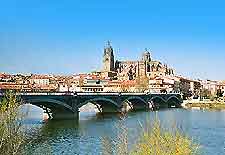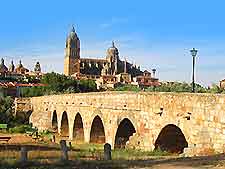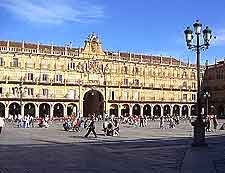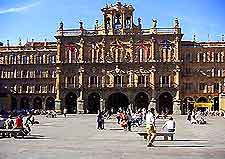Salamanca Life and Visitor Travel Tips
(Salamanca, Castilla y León, Spain)

A spectacular city full of modern architectural gems and historical buildings, Salamanca has gained the prestigious and well-deserved title of UNESCO World Heritage City. The tourism trade in Salamanca is increasing greatly as more people begin to discover the appeal of this city. Travel tips and events listings are available throughout Salamanca, at a range of tourist information offices, kiosks and local newspapers.
Much of life in Salamanca is now based around both the thriving tourist industry and the vast university complex, with plenty of hotels and restaurants to support the influx of visitors. The Salamanca University (Universidad de Salamanca) is one of the oldest universities in the country and consists of four main schools, supporting over 35,000 students.
Tourism and Tourist Information (Oficinas de Turismo)
A number of tourist information outlets and kiosks are available in and around Salamanca, offering a range of travel tips, leaflets and brochures, magazines and general advice. Salamanca's Municipal Tourist Office on the Plaza Mayor actively promotes tourism within the city, while the main Tourist Office, located within the famous Casa de las Conchas (House of Shells), concentrates on both the city and surrounding regions.
Municipal Tourist Office
Address: Plaza Mayor 14, Salamanca, Spain
Tel: +34 923 218 342
Open hours: daily - 09:00 to 14:00 and 16:30 to 18:30
Salamanca Tourist Office
Address: Casa de las Conchas, Rua Mayor, Salamanca, Spain
Tel: +34 923 268 571
Open hours: daily - 09:00 to 14:00 and 17:00 to 19:00

Language
Spanish is the third most widely spoken language in the world, behind Chinese and English. Although Spanish is the main language in Salamanca, English, French and German are usually understood at most places catering for tourists. Castilian Spanish is the official language in the area, although in the surrounding regions, Basque, Catalan and Galician versions of Spanish may be spoken. For excursions outside of Salamanca, phrase books are often extremely helpful.
Tipping
Tipping is quite discretionary in Salamanca, with taxi drivers often being pleased with a little rounding up when it comes to paying, although this is by no means essential and you should never feel pressured into this. Restaurants must include service charges by law and these should be clearly stated on all of their menus, although a small tip will still be expected and very much appreciated. Hotel staff, such as luggage handlers, happily accept a tip of a Euro or two. Generally, no other public service workers in the city of Salamanca expect to be tipped. You should always pay tips in cash, to guarantee that the person it is intended for receives it fully.

Places of Worship
The national religion of Salamanca and throughout Spain is Roman Catholic, although countless further faiths and religions are also present in Salamanca, including Protestants and Muslims. There are a large number of churches, chapels and religious buildings that welcome visitors to the area and these often hold services seven days a week. Salamanca is home to two historic cathedrals, the 12th-century Old Cathedral (Catedral Vieja) and the 16th-century New Cathedral (Catedral Nueva).
Smoking
Many public buildings in Salamanca now restrict smoking, together with public transport, restaurants, bars and hotels. The rights of non-smokers tend to outweigh those of the smoker, and it is always worth being cautious when selecting places to smoke, with harsh fines for those smoking in no-smoking areas. However, the majority of bars in Salamanca offer designated smoking areas or separate rooms, with many smokers also choosing to smoke outside.

Tips for Using the Euro
The Euro is made up of eight coins and seven paper notes and was introduced on January 1, 2002. The 12 original members of the European Union - Austria, Belgium, Finland, France, Germany, Greece, Ireland, Italy, Luxembourg, Netherlands,
Portugal, and Spain - planned the event for many years in advance, deciding upon a specific conversion rate for each country's national currency. The colourful Euro bills, which include holograms and shades of green, yellow, blue, mauve, and orange, are identical throughout Europe. Coins have one common and one national side, but they can be used in any of the member countries, regardless of the country of issue. Old currencies are no longer accepted as legal tender, although major banks will happily convert them into Euros.
Telephones and Emergency Numbers
- Emergencies in Salamanca - for police dial 091 (national) or 092 (local)
- For fire emergencies in Salamanca - dial 080 or 085 and for an ambulance dial 409 5530
- To call from one city code to another in Salamanca- first dial '0' followed by the Spanish city code and the main telephone number
Safety
As with all big and bustling cities, Salamanca's main security threat are pickpockets and bag snatchers, so always be aware of personal belongings. It can be advisable to wear handbags and cameras across your body in Salamanca and avoid leaving and valuable belongings in parked cars or hotel rooms.
Taxes
VAT (IVA) is always included in the price and refunds are unusual in Salamanca and throughout Spain. Tourists visiting the city from countries outside of the EU may claim tax refunds when the item was purchased for personal use and cost more than a certain amount. Shopkeepers in Salamanca can provide additional details if required.
 A spectacular city full of modern architectural gems and historical buildings, Salamanca has gained the prestigious and well-deserved title of UNESCO World Heritage City. The tourism trade in Salamanca is increasing greatly as more people begin to discover the appeal of this city. Travel tips and events listings are available throughout Salamanca, at a range of tourist information offices, kiosks and local newspapers.
A spectacular city full of modern architectural gems and historical buildings, Salamanca has gained the prestigious and well-deserved title of UNESCO World Heritage City. The tourism trade in Salamanca is increasing greatly as more people begin to discover the appeal of this city. Travel tips and events listings are available throughout Salamanca, at a range of tourist information offices, kiosks and local newspapers.

